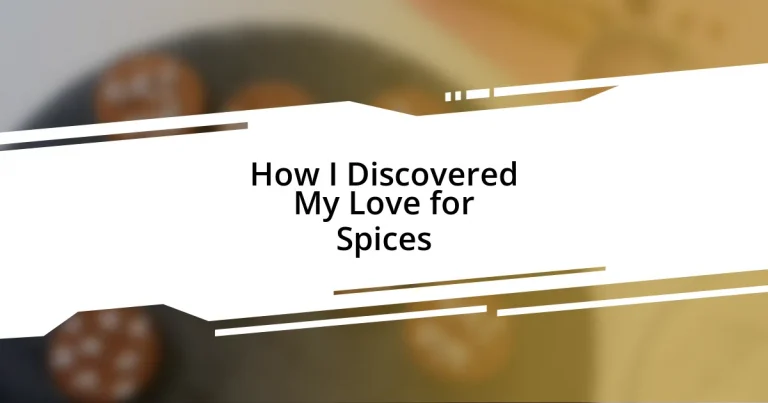Key takeaways:
- The author’s love for spices began in childhood, inspired by cooking with their grandmother and learning about the significance of various spices.
- Traveling through Southeast Asia and India deepened the author’s understanding of regional spice uses and cooking techniques.
- Experimenting with spice blending is highlighted as both an art and a personal expression, leading to memorable culinary experiences.
- Sharing spice-related experiences with friends has fostered connections and joy, enhancing the overall journey of culinary exploration.

My Early Culinary Experiences
My earliest memories in the kitchen are vivid and fragrant. I can still recall the warmth of my grandmother’s kitchen, where we spent countless afternoons grinding fresh spices together. There was something magical about that moment—doesn’t the scent of cumin and coriander transport you somewhere special?
As I mixed the spices, I felt a connection not just to the ingredients, but to my heritage. I remember asking her why certain spices were used in specific dishes, and her eyes would light up as she shared stories from her childhood. Those conversations sparked a curiosity in me—how could something as simple as a pinch of turmeric change a dish completely?
In my adolescent years, I started experimenting on my own. I remember one evening, alone in the kitchen, I decided to make a stir-fry. I tossed in whatever I could find, but it was the unexpected sprinkle of five-spice powder that elevated the whole dish. That moment taught me how a single spice could transform the ordinary into the extraordinary—it was a realization that shaped my culinary journey.
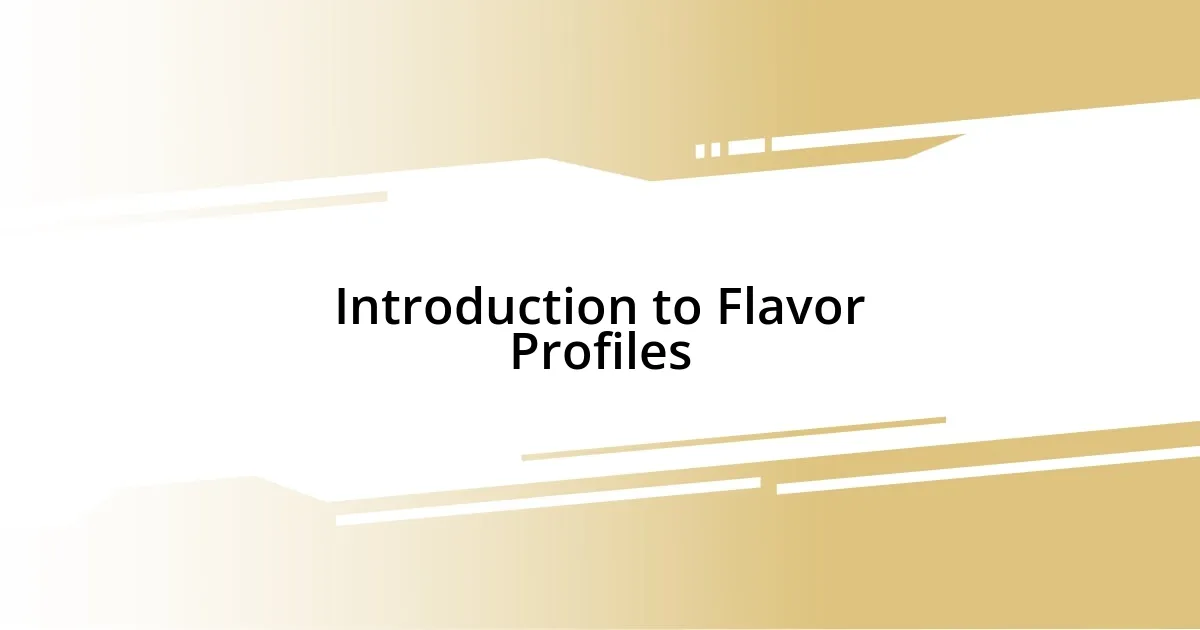
Introduction to Flavor Profiles
Flavor profiles are the essence of culinary exploration, offering a spectrum of tastes that can evoke memories and emotions. I remember my first encounter with a dish that was perfectly balanced—the experience of tasting a well-crafted curry made me realize just how each spice plays a distinct role in achieving harmony. It’s fascinating how flavors come together, creating depth and nuance that can transport you to another place entirely.
Understanding flavor profiles can enhance your cooking immeasurably. Here are some key components that shape them:
- Sweetness: Often from sugars or honey; provides balance and richness.
- Sourness: From ingredients like vinegar or citrus; adds brightness and complexity.
- Bitterness: Found in greens or certain spices; can add depth or contrast.
- Saltiness: Enhances other flavors and brings a savory quality.
- Umami: A savory taste from ingredients like mushrooms or aged cheeses; rounds out the flavor experience.
- Heat: From peppers or spices; can ignite excitement and warmth in a dish.
By exploring these elements, I realized that creating a dish is much like composing music; each flavor is a note that contributes to a larger symphony. It’s this intricate dance of flavors that keeps my passion for spices alive.
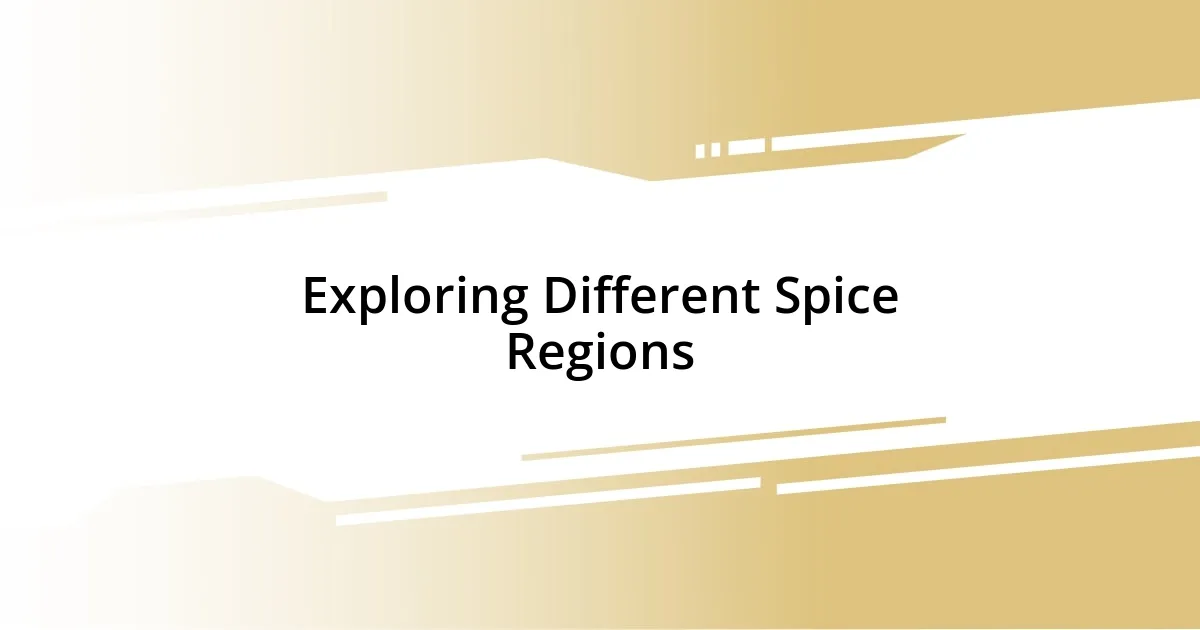
Exploring Different Spice Regions
One of my most eye-opening moments in exploring spices came during my travels through Southeast Asia. The vibrant markets of Thailand left me breathless—colorful stalls overflowing with chilies, lemongrass, and fragrant basil. I still remember the heat of the late afternoon sun as I squatted beside a local vendor, inhaling the scents that danced in the air. I had never encountered anything like the tangy sourness of tamarind before; it was as if the flavor told me a story of the land and its people.
In India, I found myself captivated by the intricate blend of spices used in curries. I remember a cooking class where the instructor shared a kitchen secret: the importance of tempering spices in hot oil to unleash their true potential. The moment those spices hit the pan, I was enveloped in a flavor explosion that ignited my senses. It’s fascinating how regional techniques still influence my cooking; I often reach for those same spices with a sense of nostalgia, recreating that magical atmosphere in my own kitchen.
Now, as I think about the spice regions of the world, I often reflect on how each culture’s unique relationship with spices shapes their culinary identity. There’s a warmth in the African spice blends like berbere, a blend that bridges different food traditions together. Sometimes, I catch myself daydreaming about how every pinch of spice can carry a piece of history, a hint of adventure, or a dash of love.
| Spice Region | Popular Spices |
|---|---|
| India | Cumin, Turmeric, Cardamom |
| Thailand | Lemongrass, Galangal, Chili |
| Morocco | Cinnamon, Cumin, Ras el Hanout |
| Mexico | Cilantro, Chili Powder, Oregano |
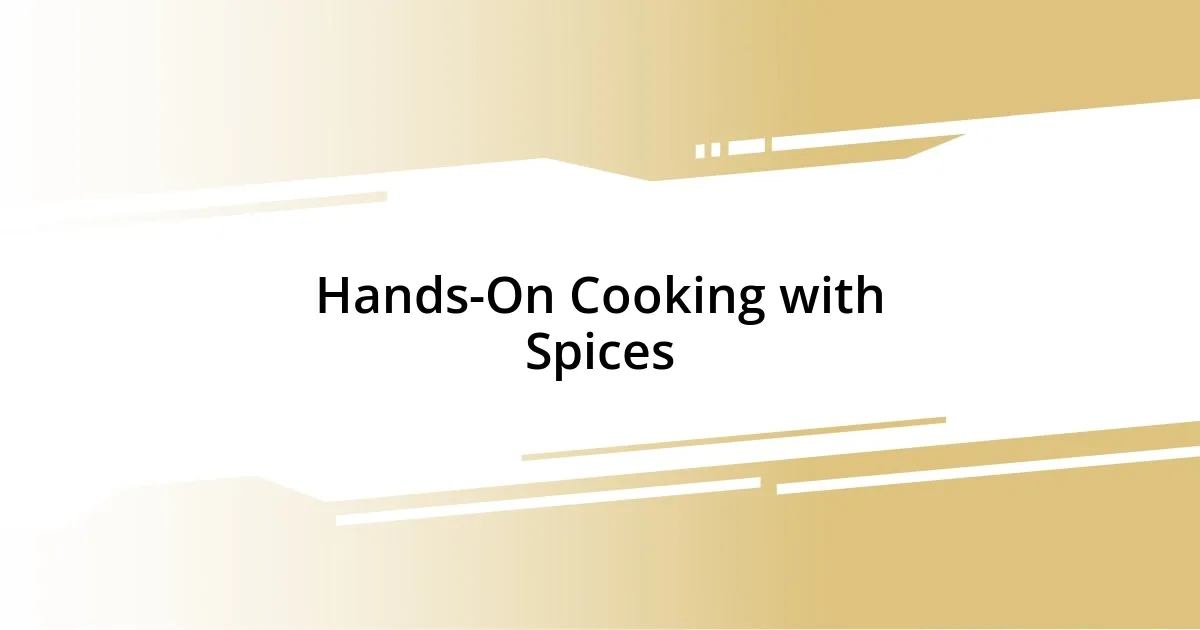
Hands-On Cooking with Spices
Cooking with spices is a truly hands-on experience that brings energy and excitement into the kitchen. I remember when I first tried my hand at creating a simple spice blend for roasted vegetables. As I crushed cumin seeds and mixed them with coriander, the warm, earthy aromas enveloped my space. Can you imagine the anticipation I felt, knowing that these little grains would transform plain veggies into something extraordinary?
There’s something magical about feeling the texture of spices in your hands. I often find myself experimenting, mixing and matching spices on a whim. Once, I added a pinch of smoked paprika to a basic tomato sauce. The depth it introduced was astonishing! This taught me that cooking with spices isn’t just a science; it’s an art that invites creativity. Have you ever felt that thrill of discovery while experimenting in the kitchen? It’s exhilarating when flavors come together unexpectedly and create a masterpiece, even if it’s just a weeknight meal.
In my ongoing culinary journey, I’ve learned that cooking with spices is all about intuition and personal touch. I recall a cozy evening when I decided to recreate a Mexican mole I had savored during a trip. Using chocolate, chilies, and a surprising dash of cinnamon, I felt as though I was weaving a tapestry of flavors. The moment I took the first bite, I was transported back to the vibrant streets where I first experienced it. Isn’t it incredible how a well-composed dish can connect us to our memories and adventures?
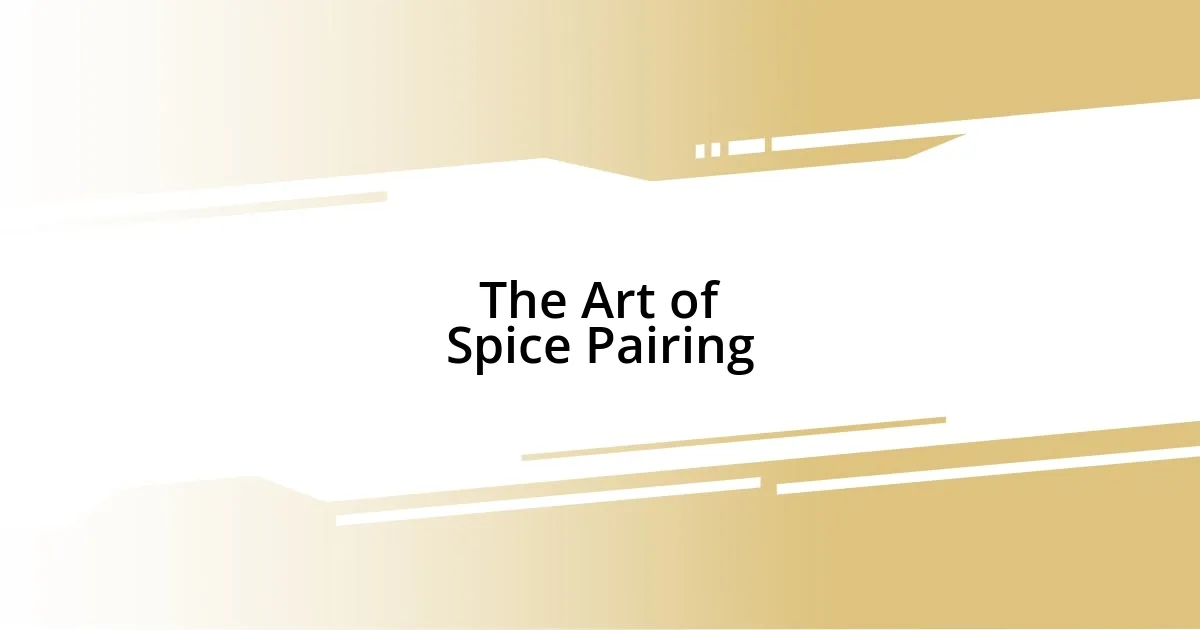
The Art of Spice Pairing
The art of spice pairing is like creating a musical composition. Each spice has its own unique notes, and when blended skillfully, they can produce harmonious and delightful results. One of my favorite experiences was when I paired cardamom with orange zest in a dessert; it was as if the two were meant to dance together, elevating the flavors to a new level. Have you ever stumbled upon a combination that left you speechless?
I remember experimenting with spices while preparing a Moroccan dish. The juxtaposition of cinnamon with savory cumin was a surprise to my palate. It prompted me to consider how balance plays a crucial role in spice pairing. Too much of one spice can overshadow the others, while the right blend creates complexity and depth. This realization inspired me to approach cooking with a sense of curiosity. What hidden flavor partners might be waiting in your spice cupboard?
Over time, I’ve learned that spice pairing often reflects the experiences and emotions tied to the food. When I combined fresh basil with spicy chili flakes in a pasta dish, it evoked memories of sun-soaked afternoons in Italy, where flavors danced joyously together. This is the beauty of spice pairing—it can transport us to different times and places. Each thoughtfully chosen pairing tells a story, inviting us to connect with our meals on a deeper level. How do your favorite spice combinations resonate with your own experiences?

Creating Custom Spice Blends
Creating custom spice blends is one of the most fulfilling aspects of cooking. I remember the first time I mixed my own blend for a barbecue rub; it was a blend of brown sugar, smoked paprika, garlic powder, and a touch of cayenne. The moment I sprinkled it on the ribs, I felt a thrill, knowing I was infusing my meal with flavors that were uniquely mine. Have you ever crafted something special that made your taste buds sing?
When I decided to create a vibrant spice mix for a homemade curry, I reached for turmeric, cumin, and fenugreek, letting my instincts guide me. The process felt almost meditative, as I ground the spices together, releasing their fragrant oils. Each time I used this blend, it took me back to the street markets of India. Isn’t it amazing how your own creations can evoke such vivid memories?
Beyond just taste, crafting spice blends allows for a unique expression of personality in cooking. I often revisit failed blends too, like my attempt at a “herb-centric” mix that turned out too grassy for my liking. I learned that every experiment contributes to my spice journey, enriching my understanding of flavors. What lessons have you learned from your own kitchen misadventures?

Sharing My Spice Journey
Sharing my spice journey has been an incredible adventure filled with exploration and surprise. There was one winter evening when I decided to experiment with cloves in my hot chocolate. The warmth of the spice added a depth I never expected, turning a simple drink into a cozy hug in a mug. Have you ever discovered a surprising spice that transformed your mood?
As I navigated my spice journey, I made it a point to seek out local spice markets during my travels. I recall walking through a vibrant market in Istanbul, the air thick with the scent of saffron and sumac. It was overwhelming and intoxicating, igniting a desire to bring a piece of that experience back to my kitchen. How do spices reflect the cultures you’ve encountered?
I’ve also realized that sharing my spice enthusiasm with friends during potlucks has created moments of both joy and laughter. Once, I introduced friends to za’atar on roasted vegetables, and their delight at this new flavor was priceless. Seeing their reactions and hearing their adventurous tales brought us closer together. What spice stories have you shared that have brought a smile to your face?












